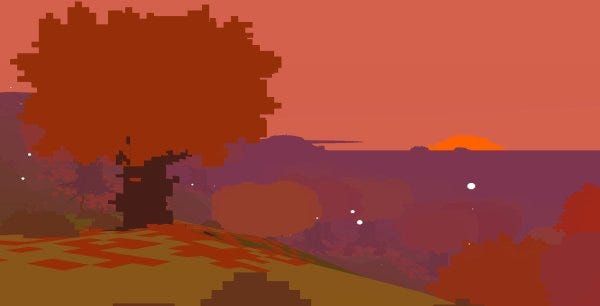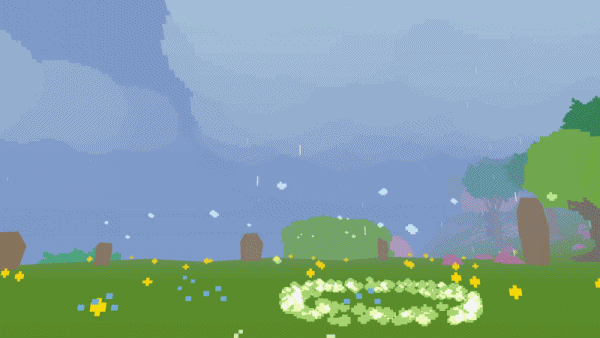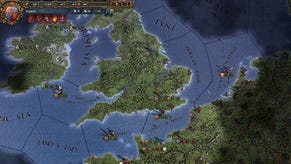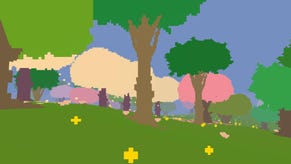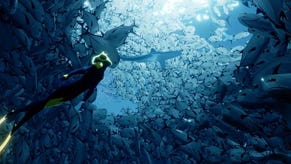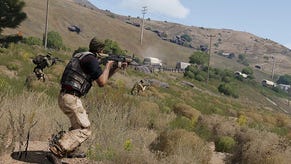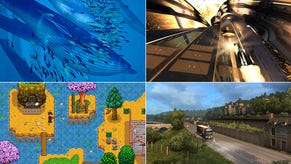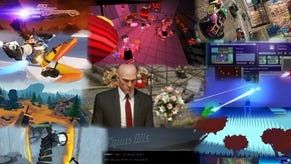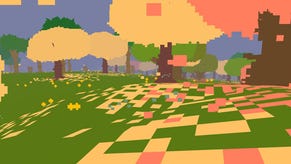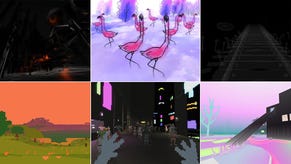Wot I Think: Proteus
Operatic
Ed Key and David Kanaga's Proteus has been floating around for a while, almost finished, almost finished. But now it finally is, and up on Steam, and I've been playing it on a loop. A game I really didn't get the first time I enjoyed its pretty colours on a GDC show floor, now makes complete sense to me. Going in, I had no idea what to expect. Coming out, here's wot I think.
You know that feeling, when you've been to see an amazing movie, and you come out of the cinema and feel like if you just ran fast enough down the street you could fly? It's not quite that. It's slightly more ethereal, less energetic and more emotional. Not, "boo hoo" emotional. I mean, "just found out he/she fancies me" emotional.
It's somewhere near that, the way I'm left at the end of Proteus's forty-five minutes or so of ambient exploration. A soaring high, uplifted, and slightly drained.
Proteus is simply wandering around a small island. From your side, there really isn't any more to it than that. You wander through the four seasons, the transitions somewhat initiated by you, exploring the same patch of land (uniquely generated each time you play) as the year goes on.
Here, all the effort comes from the game itself. While you may only wander around, Proteus is conjuring wonder around you. The world is built from chunky pixels, what at first appears to be crude shapes, but quickly become a distinct impressionistic creation. Creatures made of barely 30 or 40 pixels are perfectly animated, tiny details giving them vivid life, as they flock by or hop away from your pursuit. Trees sway in the breeze, clouds roll in overhead and obscure the rising sun, bugs float idly by.
The space you have to explore is just big enough to engross you until the sun sets and the moon rises, transforming the world around you, seeing different animals emerge (or not - each time you play the world is strikingly varied). At this point, somewhere on your island, a whirl of sparkling lights catches your eye, and you head toward them.
Each time you see the world change, the desire to explore it is revived. That's what's so masterful here - even though you may have climbed that big mountain, wandered around that stone circle, and spotted that wooden shack in a valley, the desire to see it all again in new colours, with new flora and fauna, and a new sense of life, is overwhelming. And so worthwhile.
I'm dancing around telling specifics, because Proteus is about experiencing it for yourself. There are moments, tiny vignettes, I feel I could describe that would just sell it to you instantly, but it would be to destroy them. Or indeed, you may play it five times and never experience them. Instead I want to talk about the reactions I had to it, that I dearly hope others shall experience too. And I realise as I type that, I equally hope others will have wildly different experiences, positive or negative.
My main feeling was jubilance. I can't use a smaller word. As I played, I felt a persistent sense of absolute elation. Even when Autumn and Winter come around, along with every metaphorical reading associated with such times, it always felt so optimistic to me. Autumn, in our world, is a season of slow fading, and Winter a time of scarcity and death. But even in - within my interpretation at least - hinting at such things, it felt so freshly joyful, so bursting with hope. Autumn and Winter are of course also times of preparation for what's to come, and contain their own cold beauty. Proteus, for me, sang celebratory songs about them all.
It's wonderful knowing that the description above isn't spoiling anything. They're my reflections, my feelings, that I've let the game reflect to me. I am certain another player will see a different world, hear a different song.
But one thing's for sure - you will hear a song. Proteus, along with its procedurally generated world, procedurally generates its score. And it's astonishing. It takes a while before you can believe it, but here you're making the music as you play. Whether it's the bassy 'thung' of walking past a standing stone, or the way the layers of music will strip themselves down the further you climb up a mountain, at first it seems like it has to have just coincided that way. But then it keeps happening, the game keeps reacting to where you are, what you see, along with its own rolling weather, changing time, and breathtaking changes in ambient light.
There's something especially emotive about that. It creates a strong sense of connection between you and this very simple, very brief world.
Stood at the top of a high peak I hear nothing but the wind, until I walk past a standing stone, firing off its bass bomb, followed by a sprinkling of a few gentle notes. Then I walk toward a circle of strange figures and faint strings begin to play, fading again as I walk past. I stare directly into the Summer sun and my vision slowly whitens, high-pitched drones weave in and out of ploddingly shaken bells, with pings and trings speckled throughout. Looking back down my vision fades back in, the hypnotic sounds begin to disappear. But if I stand still for long enough, as night rolls in, just beneath the wind I can hear the faintest electronica vibrato, with slow, low, almost imperceptible accordion tones.
Walking back down the mountain the complexity returns, layering in over that previous tune, along with the chirrup of crickets and a new trombone-y grumble. As I walk toward a hut that tune from the mountain is now completely gone, replaced by a series of warbling notes, and perfect ambient swirls. Then an owl-shape flies from a nearby tree, and a sound that evokes tuneful hooting adds to the mix.
The sun comes up again, and I walk back through the woods, past a cloud of hovering bugs, the music brightening, the notes more cheerful, gentle percussion popping up around me, and a bouncing beast hops past with a bright 'pling' on each spring.
And all the while, the art is matching the music, the colours playing as much of a part in this orchestra as anything else, whether through subtle changes in light, slowly changing weather, or sudden ambient shifts as a peculiar event begins around me.
I'm very aware that some will come to Proteus, wander around for a few minutes, and argue there's nothing to do. Technically, sort of a bit, they're not wrong. There's no challenge, no overt goal, no secret to uncover, nor story to hear. Those people will think the above ludicrous twaddle. And that's fair enough. But there will be the others who find their own connection to its world, and embrace the three quarters of an hour it takes to go from the beginning to the end. And I'd be astonished by anyone among them who doesn't then play it again, and then again, and then demand someone else sit down and play it while they watch over their shoulder, and then play it again.
I come away from it feeling elated. And that makes Proteus feel very special to me. It's such a pleasure knowing it will be the same for so many others.
Proteus should now be on Steam, here.
